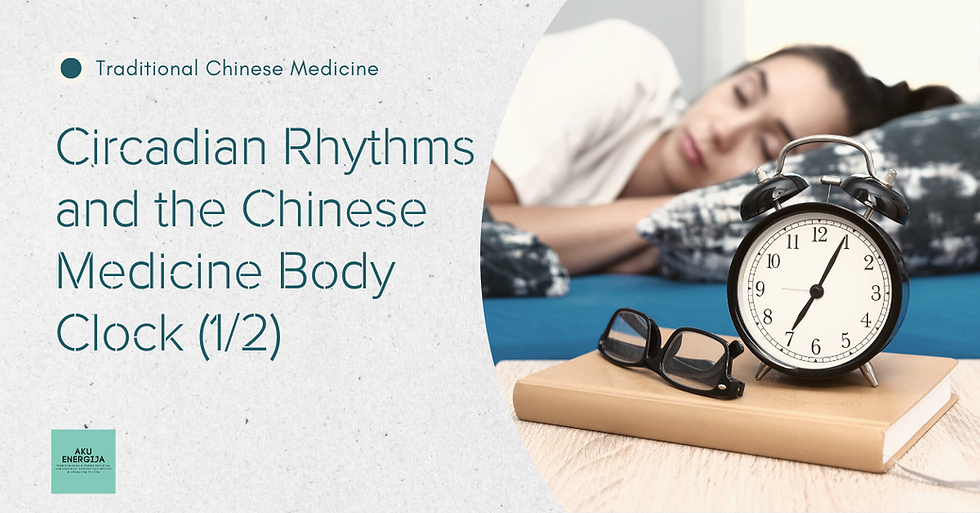The Power of Lunch Breaks - for Better Physical and Mental Health
- Aku Energija
- Aug 16, 2024
- 4 min read
In the bustling rhythm of modern life, lunch breaks often seem like mere pauses in the relentless march of daily tasks. Yet, their importance extends far beyond just a respite from work. Lunch breaks are pivotal in maintaining our circadian rhythm and enhancing productivity. Let's delve into why this mid-day break is crucial for both our biological clock and work efficiency.

Understanding Circadian Rhythm
The circadian rhythm is our internal 24-hour clock that regulates sleep-wake cycles, hormone release, body temperature, and other vital bodily functions. It’s heavily influenced by external cues like light and temperature, but also by our eating patterns. Disruptions to this rhythm can lead to various health issues, including sleep disorders, metabolic problems, and decreased cognitive function. [Read more: Circadian Rhythms and the Chinese Medicine Body Clock (1/2)] [Read more: When you eat is just as important as what you eat]
The Biological Imperative of Eating at Midday
Metabolic Efficiency: Eating lunch around noon is not just a matter of convenience or habit; it's a biological imperative that supports our energy levels, circadian rhythms, nutritional needs, metabolic efficiency, and mental clarity throughout the day. It allows our digestive system to anticipate food intake, optimizing nutrient absorption. [Read more: Risk of intermittent fasting should not be ignored]
Energy Replenishment: Our bodies expend a significant amount of energy in the first half of the day. By lunchtime, our glucose levels drop, leading to decreased concentration and increased fatigue. Consuming a balanced meal during lunch replenishes glucose levels, providing the necessary fuel for the brain and body to function optimally. [Read more: Preventing chronic fatigue with TCM]
Stabilizing Blood Sugar Levels: Regular eating patterns, including a timely lunch, help stabilize blood sugar levels. Erratic eating schedules can cause spikes and crashes in blood sugar, leading to energy slumps, mood swings, and a higher risk of cardiovascular issues. A well-timed lunch ensures a steady supply of energy throughout the day and better metabolic health[1]. [Read more: Diabetes - The TCM approach]
Lunch Breaks and Productivity
Research has increasingly highlighted the significance of lunch breaks for both physical well-being and workplace productivity. These midday respites offer more than just a moment to eat; they serve as essential opportunities for employees to recharge and enhance their overall performance. Here are some compelling reasons why integrating meaningful lunch breaks into the workday is crucial:
Improved Cognitive Function and Productivity: Continuous work without breaks can lead to cognitive overload, diminishing productivity and creativity. A lunch break offers a much-needed mental pause. This downtime allows the brain to rest and recharge, leading to improved focus and problem-solving abilities when you return to work. Employees who took breaks reported lower levels of stress [2] and improved performance [3].
Enhanced Creativity and Problem-Solving: Breaks, including lunch breaks, significantly enhance creative thinking and problem-solving abilities. Employees who took breaks were more likely to come up with innovative solutions and approaches to work-related problems[4]. [Read more: The Power of Creation by following "The Path of Least Resistance"]
Increased Physical Activity and Movement: Many people use their lunch break to incorporate some physical activity, whether it’s a walk, a quick workout, or simple stretching. Physical activity increases blood flow to the brain and releases endorphins, which can improve mood and cognitive function, making you more productive for the rest of the day[5]. [Read more: The benefits of Tai Chi]
Enhanced Social Interaction and Workplace Relationships: Positive social interactions during lunch breaks improve workplace relationships and employee well-being. These interactions foster a supportive work environment, leading to higher job satisfaction and better teamwork[6].
Reduced Workplace Stress and Burnout: Lunch breaks serve as a vital recovery period that helps reduce workplace stress and prevent burnout. Employees who consistently took breaks reported feeling more refreshed and less overwhelmed by their work demands[7].
Practical Tips for a Productive Lunch Break
Here are some practical tips to help you make the most of your lunch break:
Step Away from Your Desk: Physically removing yourself from your work environment helps in mentally detaching from work-related stress. Find a quiet spot or a common area to enjoy your meal.
Eat Nutritious Food: Opt for balanced meals rich in proteins, healthy fats, and complex carbohydrates. Avoid heavy, greasy foods that can cause sluggishness. [Read more: TCM Dietary Advice]
Incorporate Light Exercise: If possible, take a short walk or do some light stretching. This can invigorate your body and mind, preparing you for the second half of the day. [Read more: Ba Duan Jin: The Eight Brocades]
Engage in Relaxing Activities: Whether it’s reading, listening to music, or practicing mindfulness, engage in activities that relax and rejuvenate you.
Lunch breaks are far more than just a daily ritual; they are a fundamental aspect of maintaining our circadian rhythm and enhancing productivity. By understanding and respecting this mid-day pause, we can harness its benefits to foster a healthier, more productive work environment. So, the next time you consider skipping your lunch break, remember: it’s not just about food; it’s about your well-being and efficiency in the long run. Take that break, savor your meal, and return to work recharged and ready to conquer the rest of the day.
Reference:
Meal Timing and Frequency: Implications for Cardiovascular Disease Prevention (Circulation, 2017)
The Association Between Breaks and Mental Health: A Review of the Evidence (Journal of Occupational Health Psychology, 2016)
Effects of Rest Breaks on Performance and Well-being in an Office Work Environment" (Ergonomics, 2011)
The Role of Breaks in Enhancing Creative Task Performance (Journal of Applied Psychology, 2013)
Impact of Workplace Physical Activity Interventions on Physical Activity and Health (American Journal of Preventive Medicine, 2015)
Social Interactions at Work and Their Relationship with Employee Well-being" (Work & Stress, 2014)
The Role of Recovery Experiences for the Prediction of Occupational Health (Journal of Vocational Behavior, 2010)







Comments